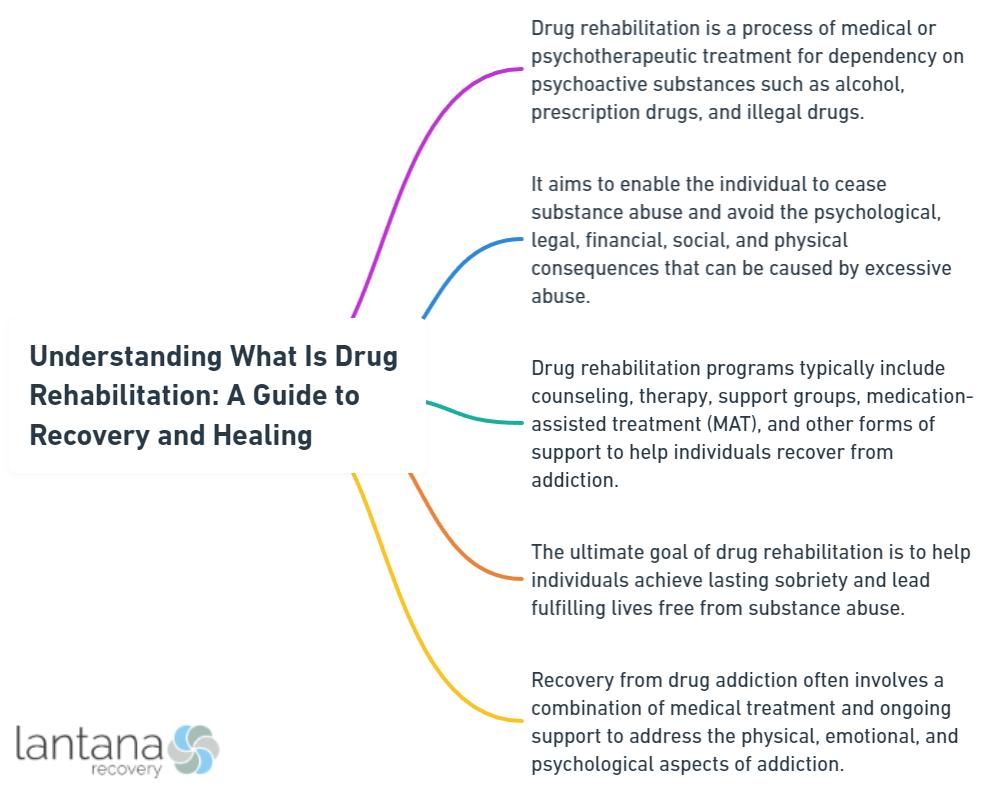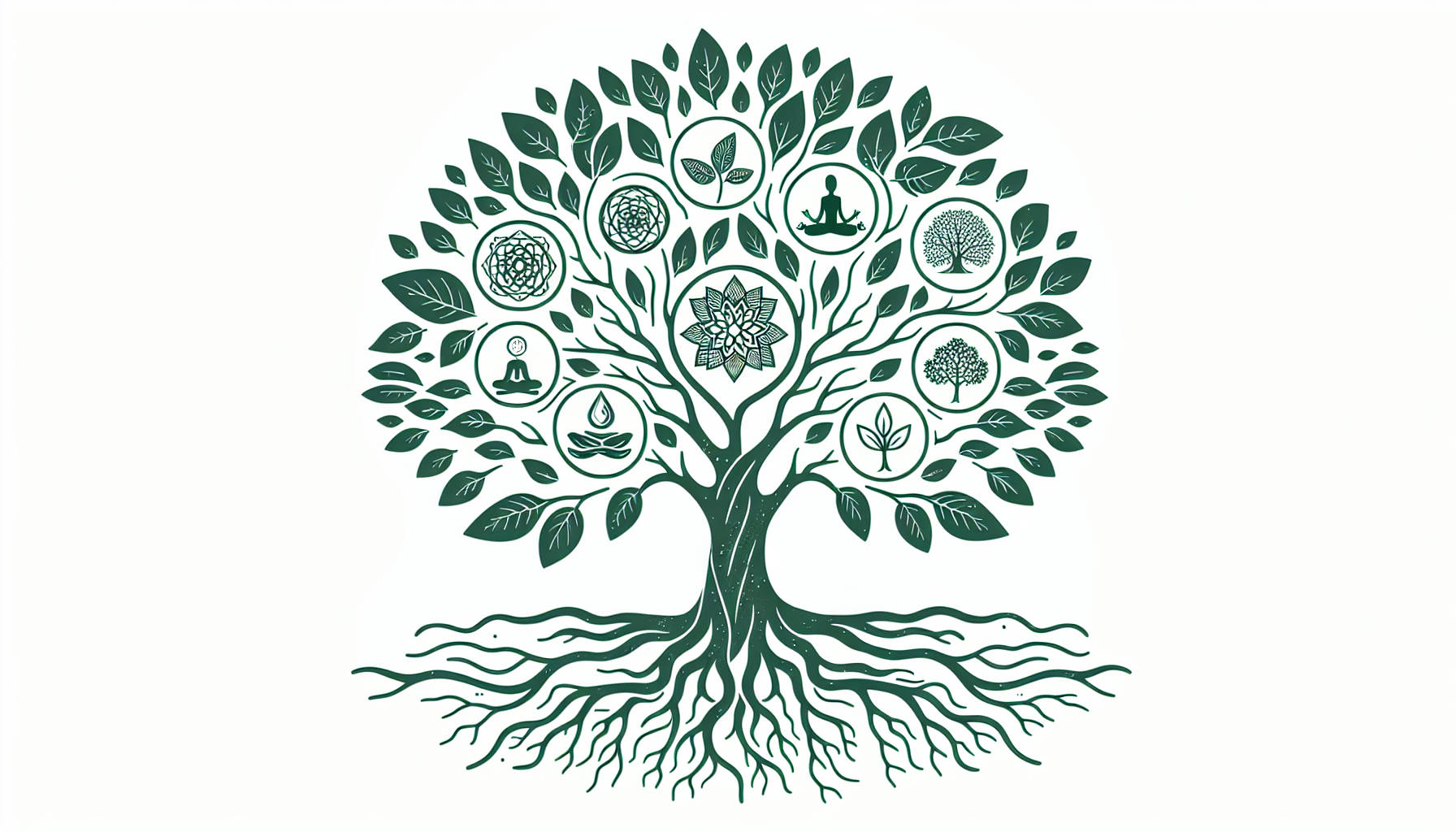What is drug rehabilitation? It’s a multi-faceted treatment designed to help individuals break free from addiction and work towards a drug-free life. This article offers an overview of drug rehab, discussing its essential process and various approaches without delving too deep too fast. Read on to find out how these programs operate and what to expect if you or someone you know is considering rehabilitation.
Key Takeaways
- Drug rehabilitation is a multifaceted process involving structured support, personalized treatments, and different therapies designed to help individuals overcome addiction and manage their lives without substance dependence.
- The drug rehab journey includes detoxification, therapeutic interventions, and aftercare support, with a focus on addressing both physical and emotional health impacts through programs like inpatient, outpatient, residential, and partial hospitalization.
- Successful drug rehab outcomes depend on evaluating personal treatment needs, integrated approaches for co-occurring mental health disorders, and personalized treatment plans that take into account individual circumstances.
Defining Drug Rehabilitation

Drug rehabilitation, or drug rehab, is a comprehensive process aimed at helping individuals overcome drug addiction and learn to live without substance use. This journey is not a solitary one; rehab centers serve as critical resources, providing essential support in the quest to curb substance abuse and restore social functioning.
The Role of Drug Rehab Centers
The role of rehab centers in the recovery journey is crucial. They provide a structured environment where clients can:
- Learn healthy relationships
- Develop coping mechanisms
- Receive support from professionals
- Participate in therapy and counseling sessions
- Engage in group activities and support groups
These elements are essential for recovery beyond treatment.
Accredited rehab centers ensure that clients receive high-quality treatment, personalized to their individual needs, promoting better outcomes.

Addressing Substance Abuse
Substance abuse, including drug abuse, is a major public health challenge, affecting not just individuals but society as a whole. It is imperative to address this issue, as substances like:
- marijuana
- cocaine
- nicotine
- alcohol
can cause a range of serious health problems.
Recovery is significantly facilitated by substance abuse treatment services, utilizing a comprehensive approach that combines medication and therapy to effectively address varying types of substance abuse.
What is Alcoholism
“What is alcoholism?” is a question that delves into a complex condition characterized by an individual’s inability to control their alcohol consumption despite its detrimental effects on their life. Alcoholism, also known as alcohol use disorder (AUD), involves a pattern of excessive drinking, leading to physical and psychological dependence. It goes beyond mere excessive drinking on occasion, becoming a chronic disease that can have severe consequences on various aspects of a person’s health and well-being. Those suffering from alcoholism often experience cravings for alcohol, tolerance to its effects, and withdrawal symptoms when attempting to cut back or quit. The condition can lead to significant disruptions in relationships, work, and daily functioning, requiring professional intervention and support for effective management and recovery.
Components of Drug Rehabilitation Programs

Effective drug rehab programs are not limited to detoxification or therapy alone. Rather, they provide structured pathways that address both the physical and emotional health ramifications of addiction. These programs foster new habits based on structured routines and self-care.
Detoxification Process
The first critical step in the drug rehab process is detoxification. It involves:
- Eliminating all traces of drugs and alcohol from the body
- Setting the stage for physical stabilization before starting therapeutic interventions
- Being overseen by medical professionals who formulate a safe and personalized detox plan based on the individual’s unique addiction history and health status.
Therapeutic Approaches

Therapeutic approaches, which come after detoxification, are another vital component of addiction treatment. These include cognitive behavioral therapy (CBT), group therapy, and alternative therapies like art and music therapy. Such therapies are tailored to help individuals manage cravings and life challenges without substance reliance.
Aftercare Support
Completing the initial rehab program does not mark the end of the recovery journey. Aftercare support is fundamental to sustained recovery, with options such as ongoing therapy, support groups, and sober living environments.
These programs and resources greatly contribute to ongoing positive recovery outcomes.
Different Types of Drug Rehab Programs

Every individual’s uniqueness reflects in the variety of drug rehab programs available. These programs vary in intensity and setting and include:
- Inpatient
- Outpatient
- Residential
- Partial hospitalization
Inpatient Treatment
Inpatient treatment requires clients to reside in a hospital or rehab facility for the duration of their treatment. This type of environment provides 24-hour supervision and a structured daily schedule that includes individual and group therapy sessions.
This form of treatment is particularly beneficial for those with severe medical or psychological conditions necessitating a high level of care.
Outpatient Treatment
Conversely, outpatient treatment offers a more flexible approach. Individuals can continue with their daily routines, such as work or school, while participating in outpatient programs, including intensive outpatient programs and treatment activities.
These programs typically involve attending treatment facilities during the day and allow clients to return home afterward.
Residential Treatment
A unique amalgamation of structure and independence is offered by residential rehab programs. They provide a communal environment for meals and activities, fostering relationship-building and peer support, crucial aspects of the recovery process.
Partial Hospitalization Programs
Partial Hospitalization Programs (PHP) strike a balance between inpatient and outpatient care. They provide a structured, intensive daytime treatment experience, while allowing clients to live at home or in a sober living facility. This option benefits those who have a solid support system and can manage a degree of independence.
Alcohol Rehab South Carolina
Finding effective alcohol rehab in South Carolina can be a crucial step towards recovery for individuals struggling with alcohol addiction. South Carolina offers a variety of treatment options tailored to meet the diverse needs of those seeking help. From outpatient programs providing flexibility for those with work or family commitments to residential facilities offering intensive, round-the-clock care, there are options available to suit various preferences and circumstances. Additionally, many rehab centers in South Carolina integrate evidence-based therapies, counseling, and support groups to address not only the physical aspects of addiction but also the underlying psychological and emotional factors contributing to substance abuse. By seeking treatment at a reputable alcohol rehab facility in South Carolina, individuals can embark on a journey of healing and transformation, supported by experienced professionals dedicated to guiding them towards a life of sobriety and well-being.
Determining the Right Drug Rehab Program for You
The decision to choose a drug rehab program is deeply personal, and it’s important to consider personal treatment needs, treatment methods, specializations, and financial circumstances.
By thoroughly evaluating these factors, you can select the right rehab program that will guide you towards a healthier, substance-free life.
Assessing Your Needs
Before selecting a drug rehab program, it’s critical to thoroughly assess personal treatment needs and history of substance misuse. Here are some steps to follow:
- Set and define personal goals for behavior change.
- Assess personal treatment needs and history of substance misuse.
- Use the information gathered to inform the choice of a rehab program, ensuring a better match and potentially more effective recovery process.
Considering Treatment Methods and Specializations
The evaluation of staff qualifications and offered therapies is crucial when choosing a drug rehab center. The type of medication used in the detox process is tailored to individual’s risk of overdose, the potential for medication abuse, and particular health and social circumstances at the drug rehabilitation center.
Who Can Prescribe Methadone
In the United States, regulations regarding who can prescribe methadone are stringent due to its potential for misuse and addiction. Methadone is primarily prescribed for the treatment of opioid addiction, particularly in medication-assisted treatment (MAT) programs. Generally, only qualified healthcare providers such as physicians, nurse practitioners, and physician assistants who have undergone specific training and obtained the necessary waivers are allowed to prescribe methadone for opioid use disorder. These professionals must adhere to strict guidelines outlined by the Substance Abuse and Mental Health Services Administration (SAMHSA) and the Drug Enforcement Administration (DEA) to ensure safe prescribing practices. Additionally, they often work in conjunction with comprehensive treatment programs that include counseling and support services to address the complex needs of individuals struggling with opioid addiction.
Evaluating Cost and Insurance Coverage
The decision-making process is significantly influenced by financial considerations. It’s crucial to consider treatment costs and explore payment and insurance options that align with one’s financial situation. Many avenues exist for covering the cost of drug rehabilitation, such as:
- The Affordable Health Care Act
- Medicaid
- Medicare
- Private health insurance
- Self-funding
- Loans
- Sometimes government funding
The Role of Mental Health in Drug Rehabilitation

Considering mental health in drug rehabilitation is of utmost importance. Physical and mental health conditions significantly influence the outcome of drug rehabilitation treatments.
Underlying mental health issues, like depression or anxiety, need to be addressed during the rehabilitation process, as they can be symptoms of a mental health disorder.
Identifying Co-Occurring Disorders
During the assessment phase, it’s vital to identify any co-occurring mental health disorders to provide concurrent treatment with addiction. This integrated approach enhances the prospects of successful recovery.
Integrated Treatment Approach
For full recovery, effective mental health management, and reducing relapse risk, treatment approaches need to be integrated and address both substance abuse and co-occurring mental health issues.
Success Rates and Outcomes of Drug Rehab
Professional drug rehab is considered the most effective method for treating substance use disorders. The measure of success in drug rehab is often gauged by the decrease in substance use and the length of sobriety patients maintain after treatment.
Measuring Success in Drug Rehab
There is no standard definition of rehab success, making it difficult to measure and compare the success rates of addiction centers. The measure of success in drug rehab is often gauged by the decrease in substance use and the length of sobriety patients maintain after treatment.
Factors Contributing to Better Outcomes
Personalized treatment plans, robust support networks, and integrated treatment approaches contribute to better outcomes in drug rehab. These factors take into account individual factors such as:
- the frequency, duration, and type of drug used
- criminal behaviors
- family and social environments
- educational background
- employment status
These factors are all critical to the success of treatment.
Summary
The journey to recovery from substance abuse is a personal and complex one. It requires a comprehensive, integrated, and personalized approach, encompassing detoxification, therapy, and aftercare. With the right support, resources, and determination, recovery is not just possible, but achievable. The path may be challenging, but the destination – a healthier, substance-free life – is worth every step.
Frequently Asked Questions
Why drug addiction is not a disease?
The concept of drug addiction as a disease is not universally accepted, as addiction is not transmissible, contagious, autoimmune, hereditary, or degenerative. Therefore, some argue that it does not meet the criteria of a disease.
Does rehab stand for rehabilitation?
Yes, rehab stands for rehabilitation, which is the process of helping someone lead a normal life again after illness or addiction.
What is the rehabilitation process?
The rehabilitation process aims to help individuals achieve their highest level of function, independence, and quality of life possible. It involves restoring biological, psychological, and social functions to promote autonomy and independent living.
How does the detoxification process work?
The detoxification process works by eliminating all traces of drugs and alcohol from the body, setting the stage for physical stabilization before beginning therapeutic interventions. Medical professionals oversee this process, creating a safe and personalized detox plan based on the individual’s addiction history and health status.
What’s the difference between inpatient and outpatient treatment?
The main difference between inpatient and outpatient treatment is that inpatient treatment involves staying at a facility for the entire duration, providing round-the-clock supervision, while outpatient treatment allows individuals to continue with their daily routines while participating in treatment activities. This allows for more flexibility, particularly for those who need to work or attend school.








